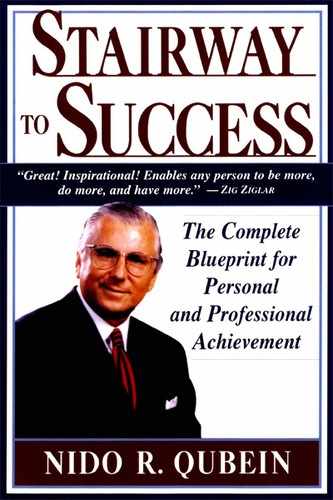6
PRELUDE TO STEP SIX
AFTER THE END, THE BEGINNING
The purpose of life after all is to live it, to taste the experience to the utmost, to reach out eagerly and without fear for newer and richer experiences.
—ELEANOR ROOSEVELT
YOu’ve heard the expression “Getting there is half the fun.” After an exciting trip to your dream vacation site, arrival can sometimes be a letdown.
It’s true of life as well as of vacation trips. Alexander the Great had a vision of world conquest, and he achieved it within his own definition. At the height of his power, his empire extended into three continents. Standing astride the Mediterranean Sea, he controlled the civilized world from the valley of the Nile in Africa to the Hindu Kush on the borders of present-day India. Yet, according to legend, Alexander wept because he had no more worlds to conquer.
Many people feel that way after they’ve achieved their visions. Many couples form a vision of a home, a career, and a family of happy, healthy children. Through hard work and ingenuity, they achieve everything they sought. Then one day they realize that the home is paid for, the children are educated and have successful families of their own, their retirement nest egg is substantial and secure–and they have nothing left to live for.
The tragedy is that many such people equate the achievement of their vision with the end of their life’s mission. Nothing could be further from the truth.
Had Alexander expanded his perspective, he might have realized that beyond the eastern edge of his empire lay the riches of China and the Indies; across the western ocean lay two immense undiscovered continents and yet another ocean. He might also have discovered a large field for cultivation in his own back yard. As the master of such an immense stretch of territory, he had an unparalleled opportunity to exert moral leadership and to effect positive political and social change that could alter history irrevocably.
Look upon your vision that same way. You have achieved what you set out to achieve. You’ve climbed your peak, and now you’re standing on the summit. What do you see? More peaks! Some may be loftier than the one you’re on; no peak is so tall that it can’t be a stepping-stone. Some may not be quite as lofty, but they’re there, waiting to be climbed, and each represents challenges and rewards different from the one you just scaled.
That’s why the sixth step on the stairway to success is “Recommitment.” When you’ve fulfilled one vision, it’s time to commit to another. The poet T. S. Eliot once wrote:
We must not cease from exploration, and the end of all exploring will be to arrive where we began and to know the place for the first time.
If you compare your life to that vacation trip, you can understand the poet’s point. You work all year long for that vacation, putting aside the necessary money, going through the travel brochures, savoring the expectation of two weeks on the beach or in the midst of mountain splendor–and the exciting things you’ll see and do en route to your destination. The pleasure of the vacation is in the savoring as well as in the experiencing. As Stephen Covey has observed, “Satisfaction is a function of expectation as well as realization.”1
The end of every vacation trip is the return home. Usually, no matter how much you enjoyed the vacation, your driveway is a welcome sight. You’re glad to be home again, sleeping in your own bed, relaxing in familiar surroundings. You’re seeing the everyday scene in a new and refreshing light. You now begin a new cycle of work and saving and savoring that eventually will bring you to another vacation. Each cycle represents an ending and a renewal.
Look upon your life that way. The achievement of your vision is the rewarding vacation you’ve worked and planned for. Enjoy it. Celebrate it. Cherish the memory. But don’t regard it as the end. Regard it as a new beginning.
The new beginning can take a number of forms. The empty-nesters who worked so hard for a stable family, a good home, and a secure retirement can now form a vision around their grandchildren. Or they can plan to travel, to cultivate new experiences, or to devote themselves to worthy causes that capture their imagination. They might even envision new and stimulating careers.
Most Americans would regard the presidency as an incomparable pinnacle. Once you’ve won the White House, what else is there to achieve? Yet many men who occupied that position created and followed new and rewarding visions.
After he left office, Thomas Jefferson founded the University of Virginia, designed its buildings, planned its curriculum, hired its staff, and became its first rector. John Quincy Adams left the presidency and entered the House of Representatives, where he pursued a long career that was in many ways more distinguished than his presidency. William Howard Taft became the chief justice of the United States after he left the White House. Herbert Hoover headed a commission charged with preventing the spread of starvation in Europe following World War II, and later led another commission that recommended important structural changes to the American government. Jimmy Carter has devoted his post–White House years to various forms of human-service activities, including the provision of housing for the poor in many lands. If these men could find fulfillment after the achievement of their most ambitious visions, so can you.
You can keep yourself in a constant state of renewal if you keep these two pointers in mind:
- Gear your life to the concept of change.
- When you find yourself on a plateau, look for another level.
